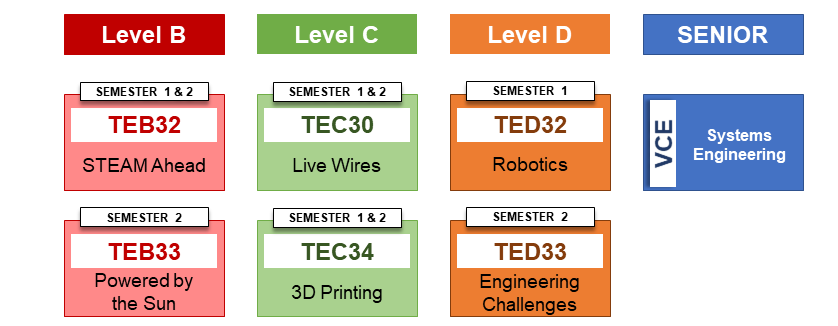Systems Engineering
The below units are available for Senior School students interested in studying Systems Engineering.
The below units are available for Senior School students interested in studying Systems Engineering.

TEB32: STEAM Ahead
In this unit students are introduced to the basic principles of Systems Engineering through a range of problem-solving exercises. Students are given real-world problems and are expected to follow a design process to find practical solutions to the given challenges. Students are exposed to a variety of scientific principles, technology, engineering, art and some basic mathematics to produce creative solutions (STEAM). Artistic and creative skills are developed to produce well-rounded final products. Diagnostic testing and product evaluation are introduced to determine whether chosen solutions function as intended and to reflect on the design process.
TEB33: Powered By The Sun
Students learn the basics of renewable energy sources through engaging and relevant projects. Students are introduced to the basic concepts involved in understanding the weather and climate science. This is built upon with investigations specifically into solar and wind energy production. This unit also introduces students to basic electronics and robotics control through the development of a variety of pre-determined tasks. Students follow a basic design process to bring design solutions to life and learn valuable programming and electronics construction techniques. They work collaboratively or individually to complete a range of tasks and communicate their design solutions through a variety of mediums.
TEC30: Live Wires
This unit involves students learning more advanced ideas and principles behind electricity. Students build a number of electronic projects. They use software to simulate, manipulate and design circuits and thereby gain an insight into how everyday devices work. Students explore the function and uses of more advanced electronic components. Students follow a basic design process to bring solutions to life and learn valuable construction techniques. At the end of this unit students are able to recognise various components, read the values of various components being used and begin basic diagnostic testing.
TEC34: 3D Printing
By following a design process, students are given the opportunity to develop their problem-solving skills to produce practical solutions to a variety of given design challenges. They learn how to use 3D modelling software, 3D printers and laser cutters to create various products. Students are exposed to a variety of scientific principles, technology, engineering, art and basic mathematics to produce creative solutions. Social and environmental issues that surround their design challenges are explored and considered with each solution. Product testing and evaluations are critically utilised to determine the effectiveness of their designed solutions.
TED32: Robotics
In this unit students take a more scientific approach to solving problems using robotics technology. Students begin the unit exploring current robotics applications used in industry and scientific fields, particularly studying how robotic systems and sub-systems are developed to make our world a safer and more practical place to live. They look at the world around them, conceive new ideas for solving problems and develop electronic and robotic solutions for a better world. Students further develop their basic electronics and Arduino programming skills through practice, whilst following a dedicated research and design process cycle. This unit prepares students for VCE Systems Engineering and beyond.
TED33: Engineering Challenges
In this unit students learn the basic principles of Systems Engineering through a range of interesting problem solving exercises. Students are exposed to a variety of scientific principles, technology, engineering, art and basic mathematics to produce creative solutions. Students follow a design process to plan and develop their projects, considering social and environmental issues within their solutions. They work collaboratively or individually to complete a range of tasks and communicate their design solutions through a variety of media. Students learn to use a larger range of workshop tools and equipment and gain skills required to safely and effectively produce their projects. This unit prepares students who intend to undertake VCE Systems Engineering.